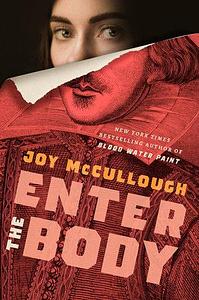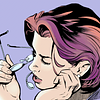You need to sign in or sign up before continuing.
Take a photo of a barcode or cover
It felt like it was a knock off Six the musical. The first one hundred pages were just recapping the stories of the main characters when it didn’t need to.
dark
reflective
fast-paced
Plot or Character Driven:
Plot
Strong character development:
Complicated
Loveable characters:
Complicated
Diverse cast of characters:
No
Flaws of characters a main focus:
Yes
I received an ARC of this book from the publisher in exchange for a fair and honest review!!
Let's talk about Shakespeare's women. I would argue that most people, especially young women studying Shakespeare in school, have often wondered about the perspectives of his female characters, especially because most of them die grim, unsatisfying deaths, typically to the character development of the male characters around them (ie. Hamlet, Romeo, Macbeth, etc.) Even more so when it comes to acting those parts, as the actress in question typically has to fill in the blanks about her character's life (what was Juliet's relationship like with her mother? Why do none of these tragic heroines have mothers??? Why did King Lear despise the mother of his children? etc.)
That said, I felt as though especially in the "intermission" part where the girls all asked one another questions, this book read more like a guided discussion course where the students are the readers. The questions that Joy McCullough wants the readers to be asking are laid out in front of them with the answers, as if to say LOOK AT THIS!! THEY DIDNT HAVE TO END UP THIS WAY!! ISNT THAT MESSED UP HOW THEY WERE TREATED!! I'd hope that most people reading Shakespeare can easily recognize the mistreatment of his female characters but I think if not, this would be the perfect book for them.
Ultimately, I feel that the questions this book is asking readers to consider are more surface-level. To conclude on a happier note: I caught the use of iambic pentameter and that was lovely! The prose was short but sweet and makes for a read that just flies by!
Let's talk about Shakespeare's women. I would argue that most people, especially young women studying Shakespeare in school, have often wondered about the perspectives of his female characters, especially because most of them die grim, unsatisfying deaths, typically to the character development of the male characters around them (ie. Hamlet, Romeo, Macbeth, etc.) Even more so when it comes to acting those parts, as the actress in question typically has to fill in the blanks about her character's life (what was Juliet's relationship like with her mother? Why do none of these tragic heroines have mothers??? Why did King Lear despise the mother of his children? etc.)
That said, I felt as though especially in the "intermission" part where the girls all asked one another questions, this book read more like a guided discussion course where the students are the readers. The questions that Joy McCullough wants the readers to be asking are laid out in front of them with the answers, as if to say LOOK AT THIS!! THEY DIDNT HAVE TO END UP THIS WAY!! ISNT THAT MESSED UP HOW THEY WERE TREATED!! I'd hope that most people reading Shakespeare can easily recognize the mistreatment of his female characters but I think if not, this would be the perfect book for them.
Ultimately, I feel that the questions this book is asking readers to consider are more surface-level. To conclude on a happier note: I caught the use of iambic pentameter and that was lovely! The prose was short but sweet and makes for a read that just flies by!
challenging
dark
emotional
hopeful
mysterious
reflective
fast-paced
Plot or Character Driven:
Character
Strong character development:
Complicated
Loveable characters:
Yes
Diverse cast of characters:
No
Flaws of characters a main focus:
Complicated
Moderate: Suicidal thoughts
Minor: Sexual assault
challenging
sad
tense
fast-paced
Plot or Character Driven:
Character
Strong character development:
Yes
Loveable characters:
Yes
Diverse cast of characters:
No
Flaws of characters a main focus:
Complicated
Joy McCullough's Enter the Body is a brilliant look at the women and girls in Shakespeare's work. McCullough gives voice to characters that have been silenced or diminished down to their deaths. I absolutely devoured this book. The structure is so well done-the story starts in the trap room beneath the stage and one by one the reader experiences the stories from Juliet, Ophelia, and Cordelia's perspective. In part 2, they each tell the story the way they would have liked it to end. It is clever, and ripe for analysis or classroom discussion. The characters that readers may already know come to life in a new way through Joy McCullough's retelling. I especially enjoyed it when the characters started interacting with each other and not staying isolated in their own stories. I highly recommend this book to anyone interested in Shakespeare's body of work.
dark
emotional
sad
medium-paced
Plot or Character Driven:
Character
Strong character development:
Yes
Loveable characters:
Complicated
Diverse cast of characters:
No
Flaws of characters a main focus:
Complicated
dark
emotional
reflective
medium-paced
Plot or Character Driven:
Character
Strong character development:
Complicated
Loveable characters:
Yes
Diverse cast of characters:
No
Flaws of characters a main focus:
Complicated
challenging
inspiring
reflective
medium-paced
Plot or Character Driven:
Character
Strong character development:
Yes
Loveable characters:
Yes
Diverse cast of characters:
No
Flaws of characters a main focus:
Complicated
A book that examines Shakespeare's take on young women in his plays and its greater implications, with special focus on the stories of Cordelia, Juliet, and Ophelia (with special mention for Lavinia for "Titus Andromicus"). As always, I am a sucker for all things retelling, and I liked how McCullough drew special attention to the injustice of the passivity and powerlessness of women in both Shakespeare's work, while drawing indirect parallels to the real world. There was a bit of a shock going from the poetic iambic pentameter of parts one and intermittently in part three to contemporary conversational dialogue, but I felt like this choice humanized the characters who otherwise are put on a pedestal of purity, or forcibly silenced for challenging the status quo.
My minor complaint would be in the "retelling" section of the book, in which our three main characters make the active choice to use Shakespeare's own habit of borrowing from history and literature to create their own stories. While McCullough takes great pains to reiterate that the choice itself is the point, and that "support and help does not mean that you do not drive your own story," there is a definite pattern of the heroines (except Juliet) relying on tertiary characters to fix their story as opposed to finding different choices for themselves.
I personally would have preferred to see a more active role for each of these charactes even in their imaginings (What if Cordelia told off her father for playing favorites and creating a competition of filial affection? What if Ophelia rejected Hamlet's mercurial tendencies in the same way he did her, and forged her own path?) but that's perhaps my own bias at work here and my own desire to rewrite the story. Even so, I did enjoy this book for how it examines the importance of women to give voice to themselves, especially in spaces that are bent on otherwise silencing them.
My minor complaint would be in the "retelling" section of the book, in which our three main characters make the active choice to use Shakespeare's own habit of borrowing from history and literature to create their own stories. While McCullough takes great pains to reiterate that the choice itself is the point, and that "support and help does not mean that you do not drive your own story," there is a definite pattern of the heroines (except Juliet) relying on tertiary characters to fix their story as opposed to finding different choices for themselves.
I personally would have preferred to see a more active role for each of these charactes even in their imaginings (What if Cordelia told off her father for playing favorites and creating a competition of filial affection? What if Ophelia rejected Hamlet's mercurial tendencies in the same way he did her, and forged her own path?) but that's perhaps my own bias at work here and my own desire to rewrite the story. Even so, I did enjoy this book for how it examines the importance of women to give voice to themselves, especially in spaces that are bent on otherwise silencing them.
funny
reflective
fast-paced
Plot or Character Driven:
Character
Strong character development:
Complicated
Loveable characters:
Complicated
Diverse cast of characters:
No
Flaws of characters a main focus:
Yes





